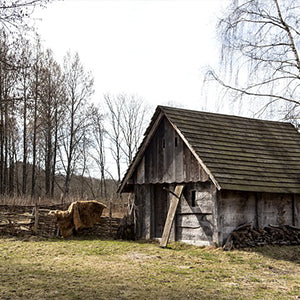Everything You Need to Know About Vinegar
Vinegar is fantastic for both cleaning and cooking BUT it's worth reading up on this miracle substance. There are areas where you should absolutely NOT use vinegar.
Vinegar may seem like a universal remedy, a miracle cure for everything BUT if you use vinegar carelessly, you can actually cause significant damage when used as a cleaning agent. Therefore, we have gathered everything you need to know about this wonderful vinegar.

Worth Knowing About Vinegar
Vinegar, as we call it, is a mixture of acetic acid and water. Depending on how we mix it, it gets different names and different functions. What we call "Vinegar" is therefore different acetic acid solutions. Thus, vinegar is acidic, not basic; the starting point is even an acid, acetic acid.
Vinegar is used in households to remove limescale deposits, for example, in coffee makers and dishwashers or kettles for that matter.
Acetic acid is very strong and has a preserving effect. It keeps bacteria and mold away from various pickles and was widely used by housewives before the freezer made its entry in Sweden.
Both vinegar and vinegar are produced through oxidation. Vinegar is made by allowing alcohol to oxidize, which then forms acetic acid. The ethanol disappears as the vinegar forms. There may be traces of alcohol in vinegar, but no amounts. Vinegar also contains acetic acid, but it is made by oxidizing wine, or cider, for example, apple cider vinegar, which is very popular right now. Vinegar is not as sharp as vinegar and is therefore more suitable in salad dressings, while vinegar is better for, for example, pickling cucumbers.

Historically About Vinegar
In Sweden, it can be said with certainty that vinegar has been used since the 17th century. In 1840, Jöns Jacob Berzelius started a factory in Stockholm to make vinegar. It then became Winborg's vinegar factory from which you can find vinegar on store shelves even today. Stensmölla Chemical Technical Industry also produced vinegar, starting vinegar production in 1881. In 1886, they changed their name to Skånska Vinegar Factory and then to Perstorp AB, you probably also recognize that company name. In 2013, Perstorp's trademark was sold to the food group O. Kavli AB.


Different Concentrations of Vinegar
Vinegar in grocery stores (in Sweden): 12% or 24%.
Previously, other names and concentrations have also occurred.
-
Glacial acetic acid: 100% acetic acid, or >90% concentration.
Not used in cooking.
It is called glacial acetic acid because it has a high melting point, i.e., it solidifies just below room temperature.
Glacial acetic acid is used for cold welding certain plastics. -
Acetic acid or acetic acid: the trivial name for pure ethanoic acid.
(In food contexts, the term has also been used a bit carelessly to describe -strong vinegar.)
Perstorp sold a 44 percent acetic acid solution until 1980, which they called acetic acid. It is no longer sold for safety reasons. It was more corrosive than vinegar of lower concentration. -
Vinegar spirit or vinegar spirit for cleaning
: 12% acetic acid solution. Despite the name, it contains no alcohol. - Pickling vinegar: 6% acetic acid solution.
- Food vinegar: 3% acetic acid solution.
- Cleaning vinegar sold by Västerbottenssåpa is 15% acetic acid solution.
Never Use Vinegar for This!!!

STONE: Marble, granite, or other stone.
If the stone contains lime (like marble), vinegar can destroy the stone slab – We remove lime from, for example, faucets with vinegar – then we should NEVER use vinegar on stone. Make it a habit to never use vinegar on any stone, regardless of stone type, to be on the safe side.
Instead, use a superfatted soap to treat the stone nicely while it gets clean, and you don't need to oil it. Västerbottenssåpa and most linseed oil soaps are superfatted.

The same applies to tiles and tiles (that are not glazed) – it's still about stone. Use a superfatted soap instead, as above.
Iron: The inside of the iron can be damaged by vinegar; use distilled water instead. One tip is to take the water out of the tumble dryer (if you have a condenser dryer); it is distilled and ready to use.
Eggs: All stains, all dirt from food where EGGS are an ingredient – avoid vinegar at all costs. Vinegar causes the egg to coagulate immediately, and the stain becomes practically impossible to remove.
Stains from: Grass, grease, or blood – do NOT treat with vinegar. Grass is removed with something alkaline, baking soda or soap. Grease is most easily dissolved with a greasy soap – like dissolves like, as the chemistry teacher preached. Blood – is most easily removed with cold water and salt.

WOOD & VINEGAR DO NOT MIX
WOOD: Do NOT use vinegar on wood. Precious woods, hardwood, are especially sensitive. Keep in mind that vinegar is an acid – the wood's surface is damaged by the acidic vinegar. Wood needs to be refatted to maintain its fine color and surface. Therefore, clean wood with fatty soap to restore its smooth surface and luster. Vinegar, on the other hand, causes it to crack and become prickly.
Softwood is less sensitive (wood from conifers) but also does not benefit from the acidic vinegar.
So: Parquet, garden furniture, etc., should never be cleaned with Vinegar!
Instead: Clean with refatting soap, linseed oil soap, or Västerbottenssåpa on a soft mop for fine surfaces. Have your garden furniture become ugly? Then scrub them with a scrubbing brush and fatty soap.
All degreasers damage wood, so be careful with dish soap and all-purpose cleaners. If you have accidentally used drying cleaning products - then oil your countertop or furniture to restore some of its former glory. Contact the seller or a well-stocked furniture store to find the right oil.
Hardwood, garden furniture that has been soap scrubbed, do NOT use vinegar

Garden furniture made of so-called hardwood that has been soap scrubbed with Västerbottenssåpa. For extra treatment, press the surface with cold water and fatty soap a few more times – you will then get the same fine surface as an old-fashioned scrub floor gets. For extra shine, oil, but note that furniture oil can stain your clothes if used in excessive doses.
Please note that we have used SOAP here! NOT vinegar!
The soap is fatty and basic, which treats wood and other natural materials.

Share
- When you make a selection, the page refreshes.
- Opens in a new window.
